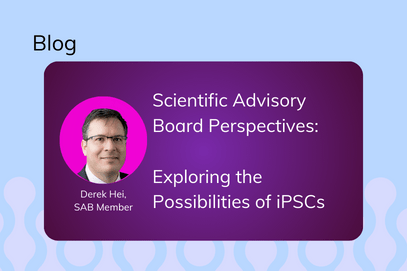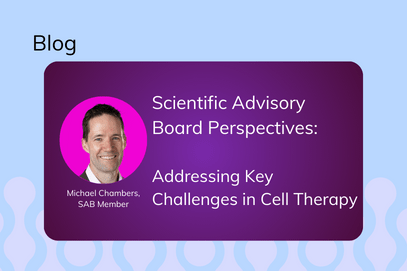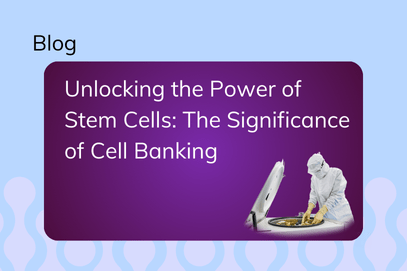RoslinCT Blog Series: Scientific Advisory Board Perspectives
Michael Kalos, RoslinCT SAB Member
Building Medicines to Change the World
The field of cell therapy has been driven by transformative ideas and is punctuated by remarkable breakthroughs.
We explored the importance of transformative approaches in the field of cell therapy with Michael Kalos, Ph.D., a member of RoslinCT’s Scientific Advisory Board and an innovator who helped to define the space of CAR- and TCR-based T-cell therapy. Prior to joining the biopharmaceutical industry, he spent a decade in academia. The laboratory Dr. Kalos founded and directed at the University of Pennsylvania established the paradigm for translational studies of cell therapy, which was instrumental to the success of the program. While at UPenn, he spearheaded the development of the analytical paradigm and assays that were employed in the earliest clinical studies of cell therapy, many of which are still used today. His contributions included clinical and intellectual property development for the program that was licensed to Novartis and led to the approval of Kymriah.
“We’ve Got Something Here”
Dr. Kalos relates an inspiring moment from his time at Penn. “You have to remember that, prior to the trial we initiated at UPenn to use CD19 redirected T cells in patient with CLL, there was no compelling evidence that T cell therapy would provide clinical benefit to patients. We went into the trial with some hope based on the preclinical data, but were more concerned with assessing safety of the treatment. After treating our first patient we collected blood samples as per protocol, processed and stored them and monitored the patient for any adverse events; the patient developed chills and fevers around the first week of treatment which we “attributed” to a low-grade infection which we treated as per standard protocols. Thirty days after the T cell infusion the protocol mandated a marrow draw to assess whether there was any activity of the therapy against tumor cells in the marrow; when the pathology report came back with no evidence of tumor cells in the marrow our first reaction was that the marrow draw was not successful, so we did a second draw.
When the second draw also came up clean for tumor cells, we said ‘we’ve got something here.’ We really had no a priori expectation that the outcome of our clinical experiment would be as impressive and transformative as it turned out to be, but that result and the ones that followed over the next two years in the CLL trial and the pediatric trial in ALL ended up moving the cell therapy field forward in important ways. And certainly, analytical testing, that is, understanding where, how, and why the therapies were working has been instrumental to the success of this first trials as well as all subsequent cell therapy initiatives.”
Being part of something that had such a profound impact on the field has driven Dr. Kalos to be involved with companies taking a transformational approach to developing medicines. “Incremental advancements are of course important milestones, but if we are not aspiring to develop therapies that have a potential to be transformative, then collectively, we are not doing everything that we can to help patients.”
Looking Ahead
When asked what has surprised him about the cell therapy field, Dr. Kalos notes the fact of how rapidly it has blossomed. “It’s a challenging modality, expensive, and cumbersome from a time and cost perspective but nonetheless, there are hundreds of clinical trials around the world. For a long time, however, there has been a lack of shots on goal that have the potential to be transformative. Many trials exist in the space of B cell malignancies, for example, that are not fundamentally different from the initial trials. Historically, when the industry has tried to be innovative, it has been from a position of looking in the light under the lamppost.”
True transformation relies on the scientific method of first developing the broadest and best data set to inform a hypothesis, and then formulating and testing a hypothesis based on that cumulative data set. “In a space that is as complex as cell therapy, if you don’t formulate your hypothesis based on as much data as you can generate and evaluate– the chances of success are essentially nil. Thankfully, we are now moving into an era where clinical trials and hypotheses are based on information that is empirically derived from both the earlier clinical trials as well as laboratory observations. For example, high throughput and unbiased screens to answer questions such as what genes make a difference for a given phenotype where strong proliferation or persistence is critical. There is a significant difference in asking the question this way versus asking whether a chosen gene makes a difference.”
Dr. Kalos believes that empirical data generation is revealing some very exciting genes that have the potential to transform the field.
“When I look at companies to invest in, build, or provide guidance to, I look for that boldness. Don’t go after the validated target because the truth is, other than CD19 and BCMA, there is nothing else that has been validated. Don’t go after the validated process. Instead, do something truly unique and different, not crazy, but something that has the potential to make a difference. And when that thesis is behind a company, I get really interested in digging in deeper and supporting them.”
The Role of a CDMO in Transformation
Manufacturing cell therapy products is complex and is a job that, according to Dr. Kalos, “should be left to the professionals.” There is a clear role for contract development and manufacturing organizations (CDMOs) to not only help transformative therapies cross the finish line and provide ongoing support post-approval but to be transformative themselves. CDMOs have an important role in developing platforms to support cell therapy programs including novel approaches that reduce the cost of goods and timelines, as well as platforms that allow for broad and robust analytical testing.
“RoslinCT falls into this place,” noted Dr. Kalos. “Their organization is client-centric, collaborative, engaged, open to and embracing novel technologies. They are driving the induced pluripotent stem cell (iPSC) space from a CDMO perspective, for example. They are actually building the innovation, not just waiting for clients to come to them with new ideas.”


